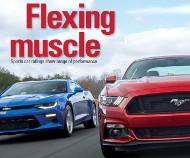7/6/2016
Virginia: Insurance Industry Photographs 65,000 Motorists In Speeding Ticket PushCovert insurance industry speed cameras tap into the private information of Virginia drivers to lobby for lower speed limits.

Three years ago, the insurance industry set up ten covert speed cameras across Northern Virginia to photograph and access the personal information of 65,000 drivers. A motorist rights group is crying foul. The Insurance Institute for Highway Safety (IIHS) gathered all of this data to make a political point.
"The association between higher speed limits and faster vehicle speeds is well-established, but not as much is known about how horsepower affects travel speeds," wrote in a May 24 report.
The report was made possible by the 2014 decision of Virginia Department of Motor Vehicle Commissioner Richard D. Holcomb to release vehicle identification number (VIN), age and sex information from the records of 65,000 vehicle owners. IIHS compared this personal information against the facial photograph captured by the industry's speed cameras to conclude that vehicles "packing more horsepower" drive faster than the posted speed limit.
Holcomb's signature was required because the privacy protection for Virginia motorist records is much stronger than provided under federal law, and the state bans the use of speed cameras. The commonwealth imposes a $1000 civil fine each time anyone "discloses personal information" gathered by a traffic camera system, but no fines are threatened here because a loophole in the law authorizes disclosure for "research." The National Motorists Association found this element of the IIHS report entirely unnecessary.
"Why precisely the insurance industry advocates felt the need to capture facial images of drivers and compare that to personal data in DMV records is a mystery," NMA president Gary Biller told TheNewspaper. "Identifying drivers isn't germane to the horsepower versus speed question."
IIHS used the VIN records to determine the exact vehicle model for each automobile photographed, including its horsepower rating. The report concluded that higher horsepower cars were 38 percent more likely to exceed the speed limit by 10 MPH.
"It's not just sports cars that are packing more power," the IIHS report explained. "Even mainstream sedans have high-performance capabilities."
Vehicle horsepower ratings have increased 60 percent since 1985 largely because vehicle weight has soared in response to federal design mandates that were imposed following IIHS recommendations. According to US Department of Transportation data, the average passenger car weighed 2867 pounds in 1985, whereas the average vehicle today tips the scales beyond 4000 pounds.
A DMV spokesman emphasized that the release of driver information for this research was entirely consistent with Virginia law.
"As outlined in the statute, the information that DMV furnishes is to be used for purposes of motor vehicle research, highway safety or promoting the general welfare of the public," DMV media liaison Brandy Brubaker said in an emailed statement. "In addition, the recipient agrees that the information furnished will be used for no purpose other than the purpose for which it is furnished."
The NMA wants the research loophole closed.
"IIHS overstepped the bounds of the Virginia statute that allows for the use of private data for limited statistical purposes," Biller said. "The NMA calls on state legislators to tighten the language of the law to prevent the indiscriminate use of individual motorist data, whether held in the DMV database or elsewhere by a state agency."
Motoring groups point out that IIHS, the leading proponent of a return to the national 55 MPH speed limit, has a vested financial interest in this subject. IIHS is both the research and the public relations arm of the insurance industry, funded by all of the major insurance firms, including AAA, Allstate, Geico, Progressive State Farm and USAA. When speed limits are lower, law enforcement agencies issue more speeding tickets, allowing these companies to raise insurance rates and collect additional revenue.


